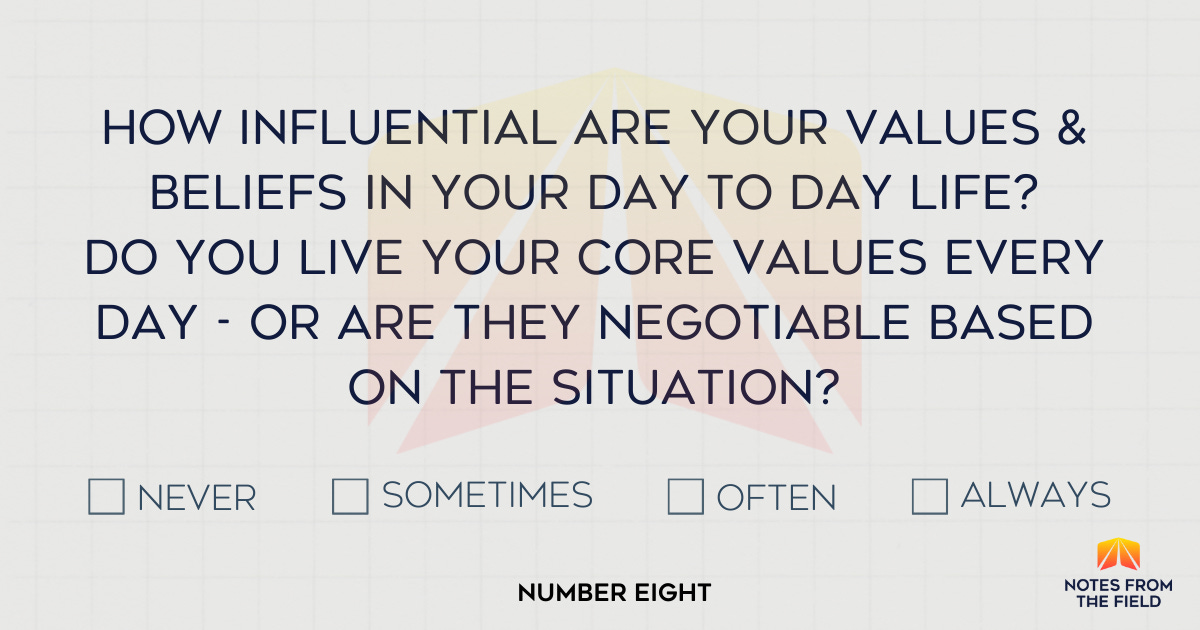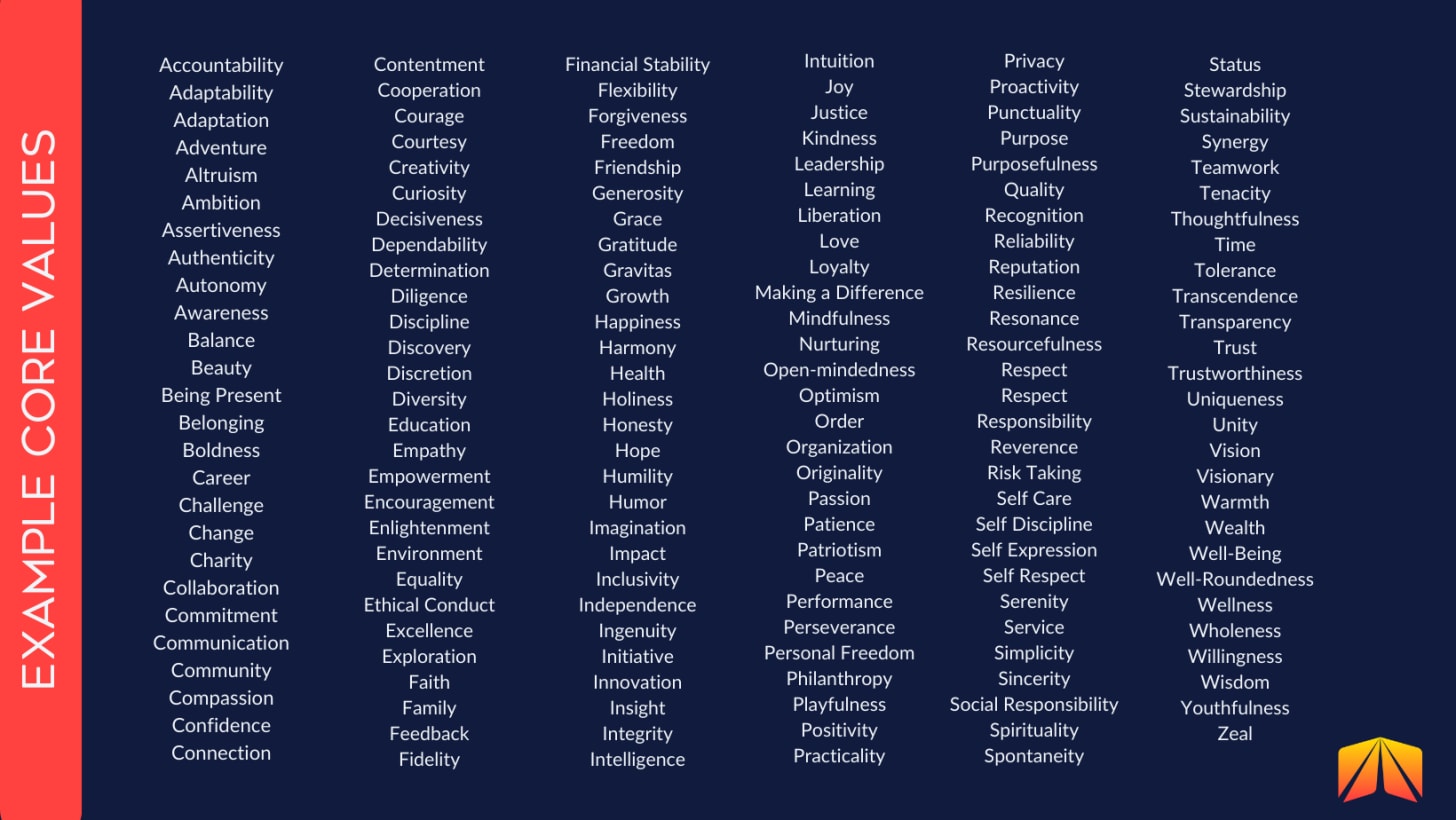On Self-Awareness: Your Core Values
Aligning your values with your work will create the impact you want for your life.
As we continue on our journey of self-discovery, let's turn our attention to a fundamental aspect of ourselves that often goes unnoticed, yet steers many of our life's decisions: our values. In the context of your professional life, this is the compass that guides you through the maze of career choices and workplace dynamics.
Core Values: A Foundation for What Matters
Your values are the intangible things you decide matter most in life. They’re what you stand for at your core, what you believe to be true, and define the path you want to take across your life and career.
When you live a life aligned to your values, the things that matter are given the most attention, focus, and effort, leading to a place of contentment and satisfaction. You feel proud to be you; you show up each day and understand what you want to achieve and the impact you create.
In short, you’re in the zone and living your best life. Why? Because you’re:
Living your life with integrity
Making great decisions and choices for you
Setting the right objectives and goals for yourself
Identifying Your Core Values
Core values are the principles that you deem most important. Think about your deeply held beliefs, motivators, and needs in your life. Your values could range widely, such as integrity and innovation to teamwork and work-life balance. Below is a list of examples of core values. Keep in mind, it isn’t exhaustive:
Identifying your top five core values may be one of the most difficult exercises within the realm of self-awareness. These are intangibles that you hold closely to the core of who you are, and it’s often difficult to clearly know and communicate these values to others.
Ultimately, your core values are core to you. Of all the aspects that make you unique, your core values are the most constant throughout your life. To identify your core values, think about what matters most to you. What aspects of your life and work are non-negotiable? These are the values you cannot live without and are major motivators in your life. You always think about them. If you don’t have this in your life, you are not you. And, perhaps more importantly, if you find yourself in conflict with other values, your core values will always take priority.
Values in Action
Your values influence how you interact with colleagues, approach your work, and make decisions. For example, if you value creativity, you might thrive in a role that allows you to innovate and think outside the box.
Reflect on times when you felt most fulfilled at work, at school, or in your personal life. What values were being honored in those situations?
Your Beliefs: Navigating the Mind’s Landscape
Understanding Your Beliefs
Beliefs are the convictions we hold to be true, most often based on past experiences, education, and culture. They can be about the industry you're in, the nature of work, success, teamwork, etc.
It's important to periodically assess your beliefs and how they influence both your career and interactions at work.
Challenging Unhelpful Beliefs
Not all beliefs serve us well. Some can limit our potential or affect our relationships negatively. For instance, believing 'work is just a means to an end' can rob you of job satisfaction.
Challenge unhelpful beliefs by seeking new experiences, perspectives, and information.
Alignment With Your Values and Beliefs
Career Choices
When your career aligns with your values and beliefs, work feels more meaningful. For example, if you value social responsibility, working for a company with strong corporate social responsibility practices might be fulfilling.
Consider how different career paths or roles align with your core values.
Navigating Workplace Dynamics
Understanding your values and beliefs helps you navigate workplace dynamics more effectively. It guides how you interact with colleagues, handle conflicts, and contribute to the workplace culture.
Conclusion: The Harmony of Alignment
Aligning your professional life with your values and beliefs is key to long-term satisfaction and success. It's about finding harmony between who you are and what you do. As we move forward, remember that these internal compasses are not static; they evolve as you grow. Continuously exploring and reassessing your values and beliefs is part of your professional development journey.
Action Plan for Your Core Values
Understanding your deeply held values and beliefs unlocks the ability to lead an aligned professional life. The steps for action are below, or you can utilize The Self-Awareness Workbook from Notes from the Field. Simply download this document, review the examples provided, and follow the path outlined to better identify, evaluate, and develop your understanding of your core values.
Step One: Identifying Personal Values and Beliefs
Task: List your core values and beliefs. Reflect on your life experiences and what matters most to you.
Objective: Establish a clear understanding of your guiding principles.
Step Two: Assessing the Influence of Values and Beliefs
Task: Reflect on past decisions and actions in both personal and professional contexts, and identify how your values and beliefs influenced them.
Objective: Understand the practical impact of your values and beliefs on your behavior and decisions.
Step Three: Aligning Values with Career Choices
Task: Evaluate your current or prospective career path and job roles in reference to your identified values and beliefs.
Objective: Ensure that your professional life is in alignment with your personal values and beliefs.
Step Four: Seeking Feedback and Perspectives
Task: Discuss your values and beliefs with mentors, colleagues, or peers and seek their perspectives.
Objective: Gain external insights and validate your understanding of how your values and beliefs manifest in a professional setting.
Step Five: Developing Strategies for Alignment:
Task: Create strategies to better align your professional life with your values and beliefs (e.g., seeking roles that match your values, advocating for changes in your workplace).
Objective: Enhance the congruence between your personal principles and your professional activities.
Step Six: Implementing and Practicing Alignment
Task: Apply the developed strategies in your everyday professional life.
Objective: Make your values and beliefs an active part of your professional decision-making and interactions.
Step Seven: Regular Reflection and Adjustment
Task: Reflect on the effectiveness of your strategies in aligning your values and beliefs with your professional life.
Objective: Adjust your approach as necessary to maintain alignment.
Step Eight: Revisiting and Reassessing Values and Beliefs
Task: Periodically revisit your values and beliefs to ensure they still represent your true self.
Objective: Keep your understanding of your values and beliefs updated and relevant.
More Resources on Your Core Values
Want to dive deeper into this topic? We recommend:
Read
Book: The Values Factor: The Secret to Creating an Inspired and Fulfilling Life by Dr. John Demartini
This book delves into the importance of having values in achieving fulfillment and success in life. Dr. Demartini provides a comprehensive guide on how to identify your true values, align your life with them, and resolve internal conflicts. It’s an excellent resource for anyone looking to understand how their values drive their behavior and life choices.
Book: Dare to Lead: Brave Work. Tough Conversations. Whole Hearts. by Brené Brown
While this book is primarily about leadership, Brené Brown extensively covers the role of values in leading a courageous and authentic life. She emphasizes the importance of clarity, and how understanding and living these values can lead to braver, more ethical, and more fulfilling experiences, both personally and professionally.
Article: How Will You Measure Your Life? by Clayton M. Christensen
In this article, Christensen explores three questions everyone needs to ask: How can I be happy in my career? How can I be sure that my relationship with my family is an enduring source of happiness? How can I live my life with integrity?
Book: Man's Search for Meaning by Viktor E. Frankl
Frankl's classic book, while not specifically about values and beliefs, offers profound insights into finding purpose and meaning in life, even in the most challenging circumstances. His experiences and observations highlight how our beliefs and the search for meaning can profoundly impact our resilience and perspective on life.
Listen
Podcast: The One Thing: How Core Values Drive Your Purpose
In a world full of choices, deciding what matters most can be tricky. We know extraordinary success is about leaning into our priorities and avoiding distractions – but how do we know when to say yes and when to say no? To help you navigate that journey, Jay Papasan discusses how identifying your values can be a compass for your life and provides a tool to point you in the direction of your purpose.
Video: Think Fast, Talk Smart: How to Communicate Your Core Values
In this Think Fast, Talk Smart podcast episode, political science professors Neil Malhotra and Ken Schotts sit down with host and lecturer Matt Abrahams to discuss how to lead others whose values may not align with your own.
Take Action
The Self-Awareness Playbook by Notes from the Field
Ready to deepen your self-awareness? Engage with the modules outlined in the playbook to understand, develop, and track your own self-awareness.
The Self-Awareness Journal by Notes from the Field
Self-awareness is a continuous journey. Our weekly, monthly, quarterly, and annual journal templates are available in Notion to deepen the connection and evolve your own self-awareness.





